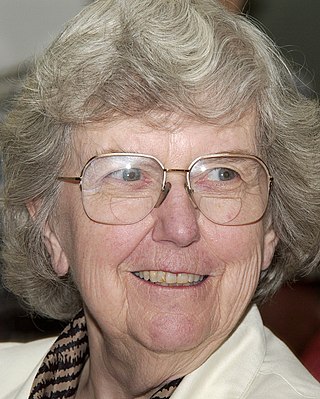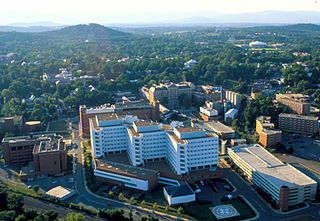Related Research Articles

Pediatrics also spelled paediatrics, is the branch of medicine that involves the medical care of infants, children, adolescents, and young adults. In the United Kingdom, pediatrics covers many of their youth until the age of 18. The American Academy of Pediatrics recommends people seek pediatric care through the age of 21, but some pediatric subspecialists continue to care for adults up to 25. Worldwide age limits of pediatrics have been trending upward year after year. A medical doctor who specializes in this area is known as a pediatrician, or paediatrician. The word pediatrics and its cognates mean "healer of children", derived from the two Greek words: παῖς and ἰατρός. Pediatricians work in clinics, research centers, universities, general hospitals and children's hospitals, including those who practice pediatric subspecialties.

The Indiana University School of Medicine (IUSM) is a major, multi-campus medical school located throughout the U.S. state of Indiana and is the graduate medical school of Indiana University. There are nine campuses throughout the state; the principal research, educational, and medical center is located on the campus of Indiana University Indianapolis. With 1,461 MD students, 195 PhD students, and 1,442 residents and fellows in the 2023–24 academic year, IUSM is the largest medical school in the United States. The school offers many joint degree programs including an MD/PhD Medical Scientist Training Program. It has partnerships with Purdue University's Weldon School of Biomedical Engineering, other Indiana University system schools, and various in-state external institutions. It is the medical school with the largest number of graduates licensed in the United States per a 2018 Federation of State Medical Boards survey with 11,828 licensed physicians.

Mary Ellen Avery, also known as Mel, was an American pediatrician. In the 1950s, Avery's pioneering research efforts helped lead to the discovery of the main cause of respiratory distress syndrome (RDS) in premature babies: her identification of surfactant led to the development of replacement therapy for premature infants and has been credited with saving over 830,000 lives. Her childhood, mentors, drive, and education inspired Avery to be the visionary that she was. In 1991 President George H.W. Bush conferred the National Medal of Science on Avery for her work on RDS.

Nancy Lynn Snyderman is an American physician, author, and former broadcast journalist. She served as a medical correspondent for ABC News for 15 years, and was the chief medical editor for NBC News from 2006 to 2015, frequently appearing on the Today show, NBC Nightly News and MSNBC to discuss medical-related issues. Snyderman is also on the staff of the otolaryngology-head and neck surgery department at the University of Pennsylvania, located in Philadelphia, Pennsylvania.
Robert Martin Jacobson is the medical director of the Population Health Science Program of the Robert D. and Patricia E. Kern Center for the Science of Health Care Delivery. He is a previous chair of the Department of Pediatric and Adolescent Medicine at the Mayo Clinic and a full professor of pediatrics at the Mayo Clinic School of Medicine in Rochester, Minnesota. He still regularly sees young patients as a member of the Division of Community Pediatric and Adolescent Medicine. His research area is in vaccinology, with a focus on delivery, effectiveness, and adverse consequences. He is also involved with the Clinical Research Training Program in the Mayo Clinic School of Medicine, where he concentrates on teaching evidence-based medicine.

The University of Virginia (UVA) Health System is an academic health care center associated with the University of Virginia in Charlottesville. The health system includes a medical center, school of medicine, school of nursing, and health sciences library. The health system provides inpatient and outpatient care and patient education and conducts medical research and education.

The George Washington University School of Medicine and Health Sciences is the professional medical school of the George Washington University, in Washington, D.C. SMHS is one of the most selective medical schools in the United States based on the number of applicants.
Calvin B. Johnson served as the 24th Secretary of Health for the Commonwealth of Pennsylvania. Johnson was appointed to his post by Governor Edward G. Rendell in April 2003 to lead the Pennsylvania Department of Health. On October 23, 2008, Johnson joined the Temple University Health System as vice president and chief medical officer.
The Incidental Economist is a blog focused on health economics and policy. It was founded in 2009 by Austin Frakt, a health economist at Boston University, who has since been joined by Aaron Carroll, a pediatrician at Indiana University School of Medicine, as co-Editor-in-Chief. The site features posts by the two as well as a number of contributing writers, who are primarily academics based across the United States. The authors often synthesize academic literature as it might relate to contemporary health policy issues.
AcademyHealth is a nonpartisan, nonprofit professional organization dedicated to advancing the fields of health services research and health policy. It is a professional organization for health services researchers, health policy analysts, and health practitioners, and it is a nonpartisan source for health research and policy. The organization was founded in 2000, in a merger between the Alpha Center and the Association for Health Services Research). In 2008, the organization had approximately 4000 health services researcher members.

Aaron A. Cohen-Gadol is a professor of clinical neurological surgery at the Keck School of Medicine of USC.

The Oregon health insurance experiment was a research study looking at the effects of the 2008 Medicaid expansion in the U.S. state of Oregon, which occurred based on lottery drawings from a waiting list and thus offered an opportunity to conduct a randomized experiment by comparing a control group of lottery losers to a treatment group of winners, who were eligible to apply for enrollment in the Medicaid expansion program after previously being uninsured.

Diana W. Bianchi is the director of the U.S. National Institutes of Health Eunice Kennedy Shriver National Institute of Child Health and Human Development, a post often called “the nation’s pediatrician.” She is a medical geneticist and neonatologist noted for her research on fetal cell microchimerism and prenatal testing. Bianchi had previously been the Natalie V. Zucker Professor of Pediatrics, Obstetrics, and Gynecology at Tufts University School of Medicine and founder and executive director of the Mother Infant Research Institute at Tufts Medical Center. She also has served as Vice Chair for Research in the Department of Pediatrics at the Floating Hospital for Children at Tufts Medical Center.

David Owen Meltzer is a Professor of Medicine at the University of Chicago. He holds faculty appointments in the Department of Medicine, Department of Economics and the Harris School of Public Policy. He is Chief of the Section of Hospital Medicine at the University of Chicago Medicine, and is the Director of the Center for Health and the Social Sciences (CHeSS), as well as the Director of the Urban Health Lab in Chicago, IL. In 2015 he was appointed a member of the faculty for the forthcoming Barack Obama Presidential Center which will be located in Chicago's South Side.
Austin B. Frakt is an American health economist who holds positions with the Department of Veterans Affairs, Boston University, University of Pennsylvania and Harvard. He is widely known as the founder and co-editor-in-chief of The Incidental Economist. His academic research has been published in major academic journals such as the New England Journal of Medicine and Health Affairs. Frakt supports the use of mainstream media as a means of translating academic research into policy relevance and has contributed to outlets including The New York Times and Bloomberg News. He serves on editorial boards of the academic journals Health Services Research and The American Journal of Managed Care and is a member of the New England Comparative Effectiveness Public Advisory Council.

Ashish Kumar Jha is an Indian-American general internist physician and academic who served as the White House COVID-19 response coordinator from 2022–2023. He has been Dean of the Brown University School of Public Health since 2020. Prior to Brown, he was the K.T. Li Professor of Global Health at Harvard T.H. Chan School of Public Health, faculty director of the Harvard Global Health Institute, and a Senior Advisor at Albright Stonebridge Group. Jha is recognized as one of the leading health policy scholars in the nation. Jha's role at Brown University focuses on improving the quality and cost of health care, and on the impact of public health policy.

Sallie Robey Permar is the pediatrician-in-chief at NewYork-Presbyterian / Weill Cornell Medical Center and the chair of the Department of Pediatrics at Weill Cornell Medicine. Her research focuses on infections affecting newborns.
Timothy Brei is a professor of neurodevelopmental pediatrics at the University of Washington and a developmental pediatrician at Seattle Children's Hospital. He is also the medical director of the Spina Bifida Association of America. Brei's research has focused on healthcare outcomes for children with spina bifida and as an adult with spina bifida who is an uncommon leader, he has also served as an advocate.
Jasmine Y. Zapata is an American physician and epidemiologist. She is the chief medical officer and state epidemiologist for community health at Wisconsin Department of Health Services. Her career includes work as a pediatrician, public health researcher, assistant professor at the University of Wisconsin, author, and her support for youth empowerment with a variety of initiatives.
Brownsyne Tucker Edmonds is a health equity researcher and physician in the Indiana University School of Medicine as well as the current Inaugural Vice President and Chief Health Equity Officer for IU Health. She also is the Indiana State Legislative Chair for the American Congress of Obstetricians and Gynecologists. She is an Associate Professor of Obstetrics and Gynecology as well as Clinical Pediatrics in the Indiana University School of Medicine. Her research focuses on making healthcare more equitable for marginalized patients.
References
- ↑ "Examining public perceptions of the value of human life at different ages in assessing costs and value of health care and preventive interventions". Robert Wood Johnson Foundation. Retrieved 9 May 2016.
- 1 2 3 "Aaron Carroll". Indiana University School of Medicine. Archived from the original on 2016-05-11. Retrieved 6 February 2024.
- ↑ Newman, Catherine (Fall 2011). "Sex, Colds and Croup". Amherst Magazine. Retrieved 7 May 2016.
- ↑ "The New Health Care". The New York Times. Retrieved 7 May 2016.
- ↑ Trapped in the System: A Sick Doctor’s Story, Aaron E. Carroll, The New York Times, SEPT. 21, 2015
- ↑ "About Aaron". The Incidental Economist. 13 August 2010. Retrieved 7 May 2016.
- ↑ Fryling, Kevin (28 August 2014). "Aaron Carroll reaches out on YouTube, traditional media to educate public on health". INScope. Indiana University. Retrieved 18 May 2016.